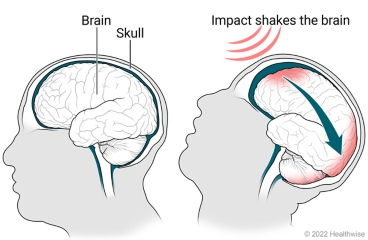
What is a closed head injury?
A closed head injury happens when your head gets hit hard. The strong force of the blow causes your brain to shake in your skull. This movement can cause the brain to bruise, swell, or tear. Sometimes nerves or blood vessels also get damaged. This can cause bleeding in or around the brain.
A concussion is a type of closed head injury.
What are the symptoms?
If you have a mild closed head injury, you may have a headache or feel "not quite right." These symptoms are common. They usually go away in a few days to several weeks. If your injury was more severe, you may have symptoms that include dizziness, nausea, vomiting, trouble talking or walking, or mood changes. These symptoms may last longer than several weeks.
Some people develop postconcussive syndrome. You may feel like you can't function as well as before the injury. And you may have new symptoms.
How is a closed head injury treated?
Any person who may have a closed head injury needs to see a doctor. Some people have to stay in the hospital to be watched. If you have a severe closed head injury, you may need medicine. You may also need surgery. Other people can go home safely. If you go home, follow your doctor's instructions. The doctor will tell you if you need someone to watch you closely for the next 24 hours or longer.
Rest is the best treatment. Get plenty of sleep at night. And try to rest during the day.
- Avoid activities that are physically or mentally demanding. These include housework, exercise, and schoolwork. And don't play video games, send text messages, or use the computer. You may need to change your school or work schedule to be able to avoid these activities.
- Ask your doctor when it's okay to drive, ride a bike, or operate machinery.
- Take an over-the-counter pain medicine, such as acetaminophen (Tylenol), ibuprofen (Advil, Motrin), or naproxen (Aleve). Be safe with medicines. Read and follow all instructions on the label.
- Check with your doctor before you use any other medicines for pain.
- Do not drink alcohol or use illegal drugs. They can slow recovery. They can also increase your risk of getting a second head injury.
Follow-up care is a key part of your treatment and safety. Be sure to make and go to all appointments, and call your doctor if you are having problems. It's also a good idea to know your test results and keep a list of the medicines you take.
Where can you learn more?
Go to http://www.healthwise.net/patientEd
Enter E235 in the search box to learn more about "Learning About a Closed Head Injury".
Current as of: December 3, 2024
Author: Ignite Healthwise, LLC Staff
Clinical Review Board
All Ignite Healthwise, LLC education is reviewed by a team that includes physicians, nurses, advanced practitioners, registered dieticians, and other healthcare professionals.

